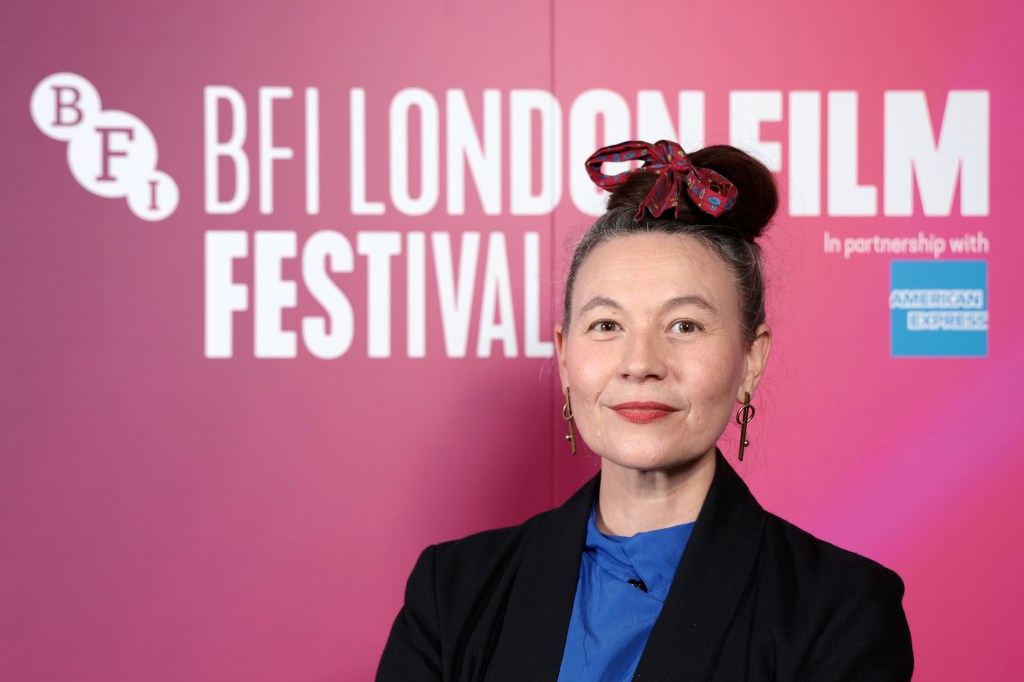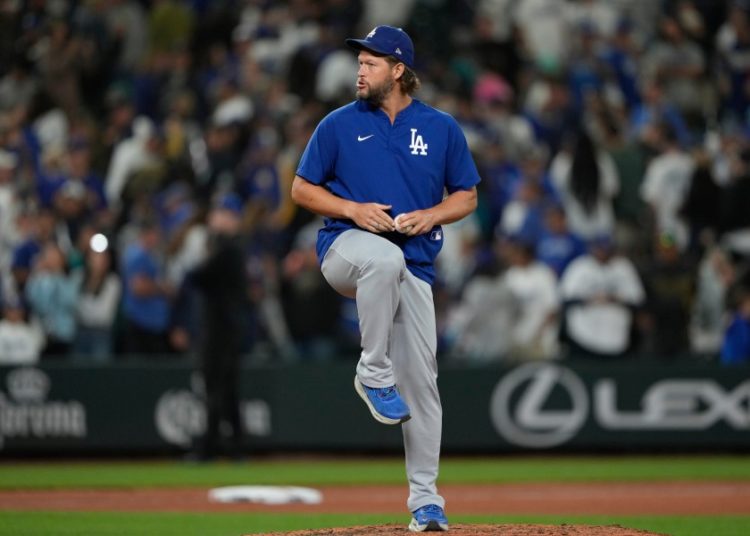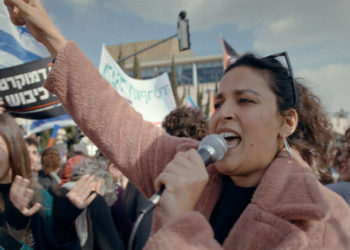The 69th BFI London Film Festival rolls into action this evening, with a screening of Rian Johnson’s third Knives Out film, Wake Up Dead Man, at the Southbank Centre’s Royal Festival Hall.
Johnson is a familiar face at the LFF, having screened his two previous Knives Out flicks as festival galas; however, the wider LFF lineup, the third pieced together by BFI Festivals Director Kristy Matheson, is anything but safe. Across the festival’s various sections, Matheson and her programming team have once again embraced a surprisingly broad collection of filmmakers and filmmaking styles. In the headline gala screening section, you can find fall festival big hitters like Yorgos Lanthimos’s Bugonia, Chloé Zhao’s Hamnet, and Bradley Cooper’s Is This Thing On? alongside Pillion, the debut feature from the relatively unknown British filmmaker Harry Lighton.
In the Special Presentations sidebar, Afterlives, the latest project by writer and filmmaker Kevin B. Lee, sits alongside the Tilda Swinton starrer Broken English from directors Iain Forsyth and Jane Pollard. Last year’s edition was similarly eclectic, with high-profile festival debuts given to art films like Madeleine Hunt-Ehrlich’s The Ballad of Suzanne Césaire and Mati Diop’s Dahomey.
“We’re trying to give a sense of the breadth of cinema,” Matheson told us of her philosophical approach to programming the festival ahead of this evening’s opening.
Other notable LFF 2025 titles include Moss & Freud, which will screen as a world premiere. The film is a dramatized account of when supermodel Kate Moss decided to sit for famed British artist Lucian Freud. Kahlil Joseph’s BLKNWS: Terms & Conditions will play the festival, and Akinola Davies Jr’s My Father’s Shadow will play in the First Feature Competition.
Below, Matheson speaks to us further about programming this year’s LFF and why introducing filmmakers who are “moving the art form in a different or new direction” into the festival’s programme is a central part of her role. Matheson also talks about political protests at this year’s LFF, which she said are “to be expected,” and the festival’s starry Q&A lineup, which includes free sessions with Jon M. Chu and Rian Johnson.
LFF runs from October 8 — 19.
DEADLINE: Kristy, how are you feeling about this year’s edition?
KRISTY MATHESON: I’m feeling incredibly proud. The team I work with here is astounding. They’re all very much experts in their own fields. With the programming team, we all meet on certain films and filmmaking styles. But we also all diverge on them as well. It’s always just a really stimulating process pulling the programme together. And by the time we’d finished this year, I said to the team that I could really see all of their personalities in the programme. I could see all their fingerprints, which is a special feeling. We have all of these different textures and flavors, but there’s still a real coherence.
DEADLINE: One thing that really struck me from the lineup is how you’ve programmed the Royal Festival Hall gala screenings. This year it includes a debut film, Pillion, and a smaller title, H Is for Hawk. Titles like this would traditionally be programmed in other sections. Why did they end up as gala screenings this year?
MATHESON: We spend a lot of time thinking about where we feel a film will have its best chance to meet its audience. For a film like Pillion, there is obviously a heartfelt connection to the director for us. We have screened their work before, and they came through the BFI Network. And when we were talking about the film, we thought, what would happen if you put it in a room of that size with that many people? Once you see the film, you can imagine that potential. H is for Hawk is a very different kind of film. It’s a very big emotional journey. But I feel like the stillness in that film will translate into a room of that size.
DEADLINE: This year’s Competition strand is very strong. There are multiple returning Competition filmmakers, including Mark Jenkin. Was it a conscious decision to make the strand more competitive than in previous years?
MATHESON: When we think about the Competition, we’re looking at these films as being representative of the whole program. It’s really about us saying these are films that are boldly approaching cinema. With a film like The Testament of Ann Lee, it’s a biopic, but Mona Fastvold’s approach to the story is so bold. Similarly, with Rose of Nevada, people who’ve seen Mark Jenkin’s work might think they know what to expect, but even still, when you watch the film, there are moments that surprise. So each of these films is compelling, but they also share an element of boldness. We spend a long time thinking about all the films, and with this section, we’re trying to give a sense of the breadth of cinema.
DEADLINE: Is experimentation a central part of your philosophical approach to the festival?
MATHESON: We are all very interested in films where we feel the language of cinema is being pushed because those are exciting moments. I mean, as much as a great performance will really move you, when you see someone playing with the form of cinema, it’s very thrilling to experience. We’ve had quite a lot of those moments in cinema this year. And definitely, as a team, we’re interested in being able to showcase filmmakers who we feel are telling great stories, but also moving the art form in a different or new direction.
DEADLINE: Yeah, you can for sure see that in the programme. I don’t think I’ve ever seen Kevin B. Lee’s work at the LFF before.
MATHESON: His film is really incredible. It will play as our Experimenta special presentation. The film posits many really interesting ideas for us to think about the world more broadly, but the filmmaking itself is not inaccessible. He’s taking very big concepts, but has an incredible way of being able to distill information. People will leave that film and have so much to discuss. But there’s nothing impenetrable about that film. He’s a very generous artist in that way.
DEADLINE: Can you talk me through the really starry LFF Free Programme? How did that come about?
MATHESON: The LFF Free programme is an important pillar of the festival for us, because we understand that most people who come to the festival are film fans. They know what we do. But there are a lot of people who haven’t been to the festival before, or maybe cinema isn’t their thing. They might be more of a talks person and go to events like book festivals. So this is a way for us to invite new audiences in. For that reason, we try to make the programme very eclectic. So there’s everything from incredible workshops for young people to discussion sessions. We also try to lean into the joy and deep love of fan cultures. So to have Jon M. Chu here to talk about the next installment of Wicked is a great moment. Likewise, Rian Johnson is coming to talk about the genre of detective mysteries. Really, it’s about honoring those fan cultures.
DEADLINE: We exist in a politically fraught time. Are you expecting protests during the festival? And if so, how are you planning to approach them?
MATHESON: It’s to be expected. The world is in an incredibly dire state in many respects, and people are reacting to that. And they’re processing that in very different ways. To me, it makes perfect sense for us as humans. So I do expect that people are going to react and express themselves.
DEADLINE: What is your assessment of the industry as a whole right now? What do you think is working? What needs improvement?
MATHESON: It’s a difficult spot from where we sit in the sense that I completely appreciate, on an intellectual level, the sheer impossibility of making a film. You hear people talk about financing and the years they spend on a project, but you can never really understand how much it takes for people to make their films. We’re in the very luxurious end of the swimming pool, where we get to just watch the films. We don’t have to make the films. And when I see the British work from my end of the swimming pool, it looks fantastic. I mean, this year alone, look at those three British films that premiered in Cannes. They’re absolutely incredible films. There’s Ish, which just premiered out of Venice, and 100 Nights of Hero, which we’re closing with. And throughout the program, we’ve got an incredible documentary, Super Nature, which we’re premiering, and Moss & Freud. In terms of diversity of story types, the genres that they’re working with and the star power in these films, it looks really healthy. But I understand that I am not in the business of the hard graft of making these films.
There are so many incredible stories that we’ve had the privilege and opportunity to see this year. From my end, I feel like our job is really to try and launch those films in the very best possible way we can, and really encourage people into the habit of seeing films. That is a really deep responsibility we feel.
The post LFF Head Kristy Matheson On The Festival’s Buzzy Competition Lineup, Platforming Filmmakers Who Are “Moving The Art Form In A Different Or New Direction” & Expecting Protests appeared first on Deadline.




